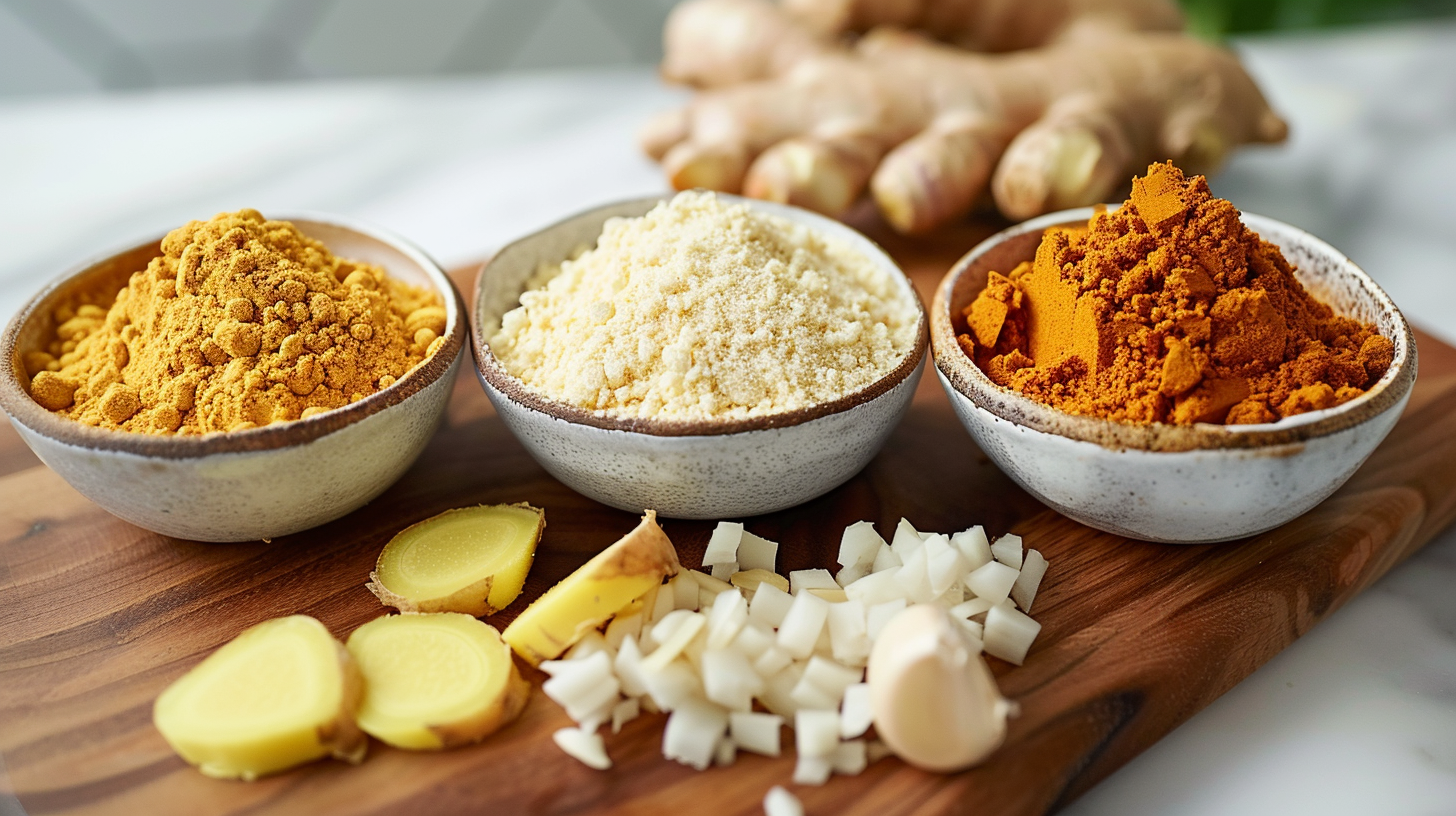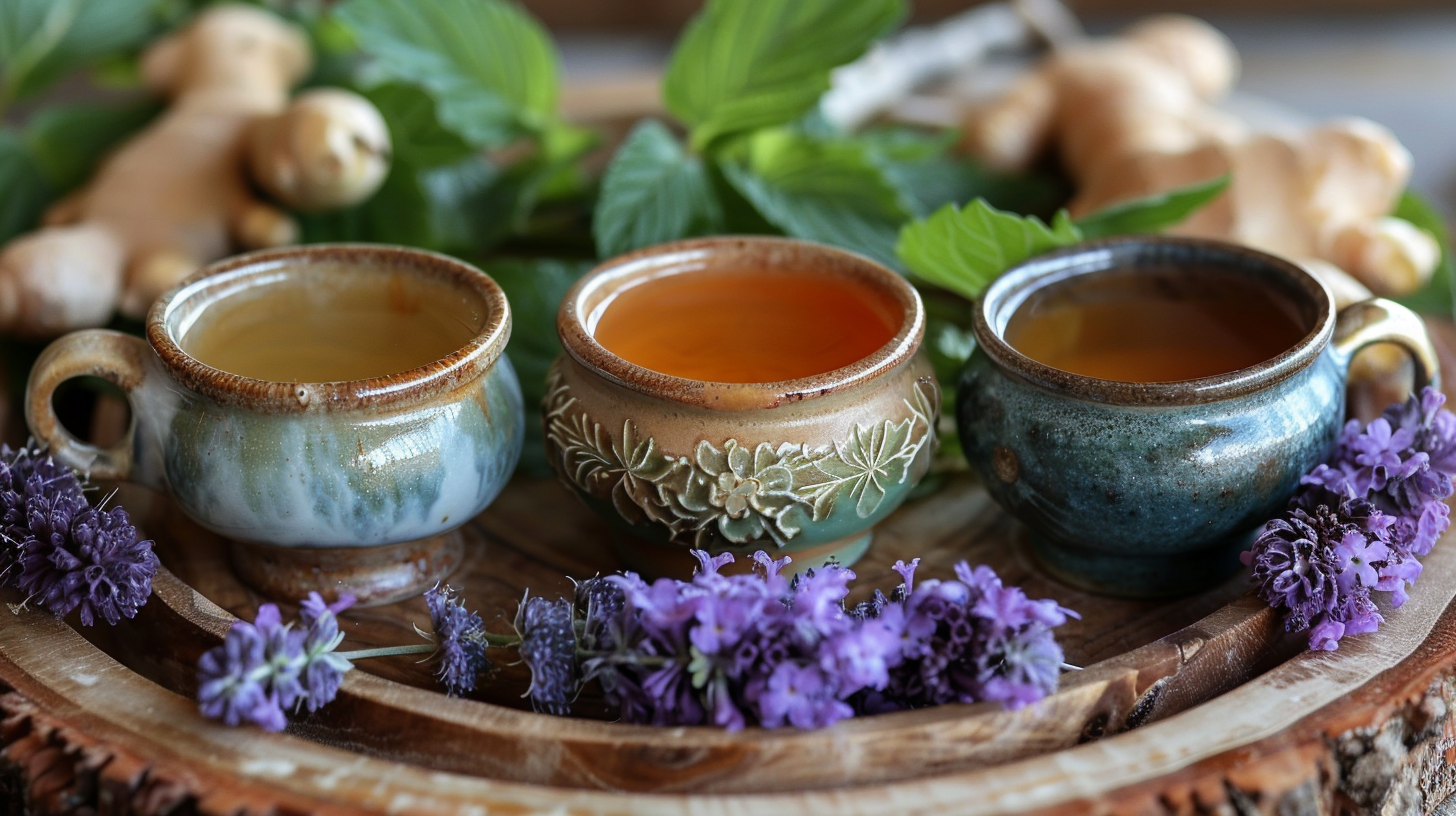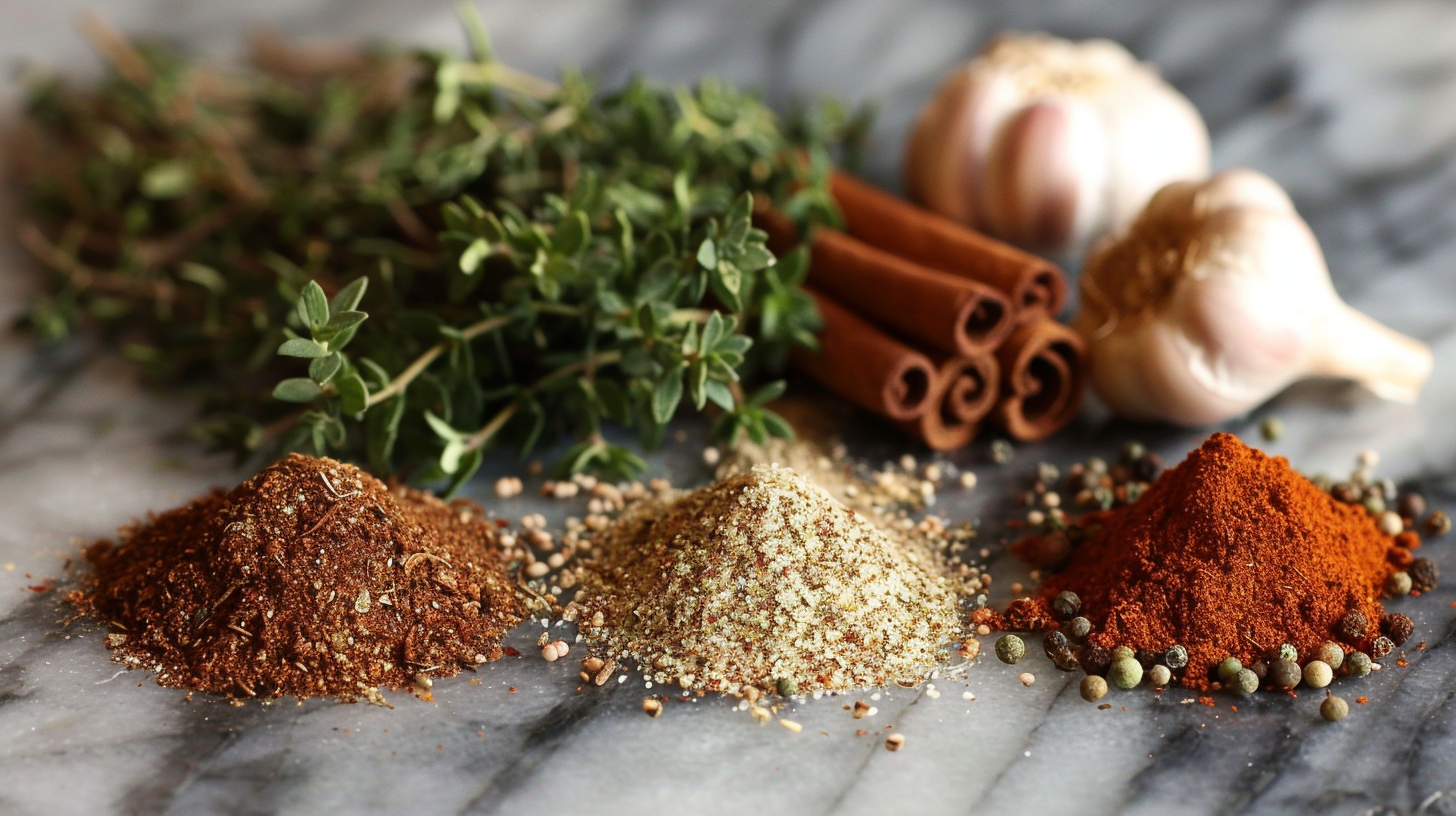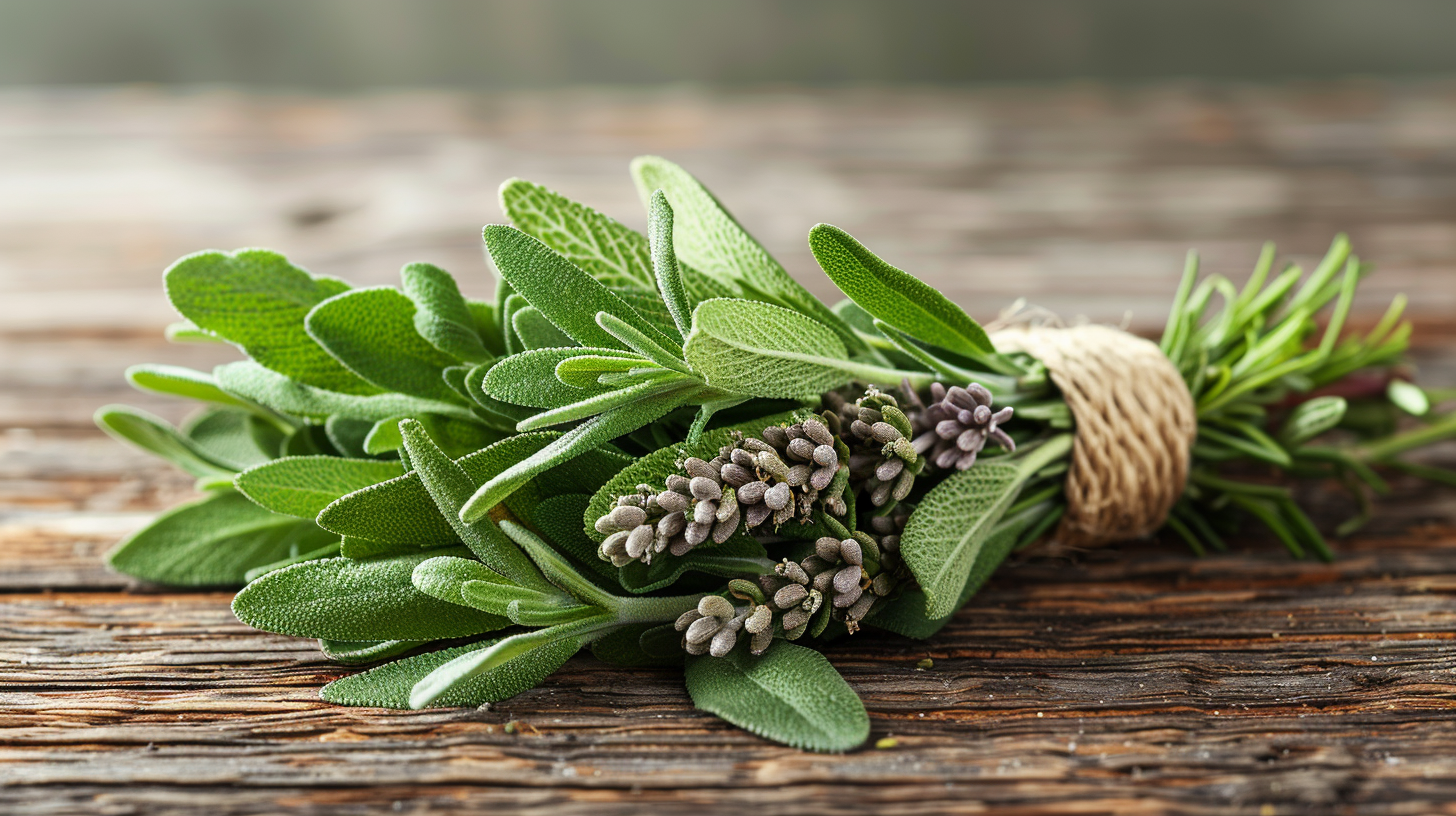
So you think herbs and spices are just for adding flavor to your food? Think again! The amazing health benefits of culinary herbs and spices will surprise you.
From anti-inflammatory and antioxidant properties to aiding digestion and boosting your immune system, these little flavor enhancers pack a powerful punch when it comes to improving your health.
Not to mention their ability to regulate blood sugar, promote heart health, and even fight off harmful microbes.
So next time you reach for that jar of herbs or spices, remember, you're not just adding taste to your meal, you're also giving your body a healthy boost.
Key Takeaways
- Incorporating at least three anti-inflammatory herbs and spices into daily meals can proactively manage inflammation and support natural healing processes.
- Adding antioxidant-rich herbs and spices not only enhances flavor but also protects cells from damage and reduces the risk of chronic diseases.
- Incorporating digestive aid herbs and spices into daily meals enhances flavor and maintains a healthy digestive system.
- Including immune-boosting herbs and spices in daily meals helps fight off infections and maintain optimal immune function.
Anti-inflammatory
To reduce inflammation in your body, incorporate at least three anti-inflammatory herbs and spices into your daily meals. These natural remedies are a great way to find pain relief and support arthritis.

Herbal medicine has been used for centuries to alleviate discomfort and promote overall well-being. Turmeric, known for its active compound curcumin, is a powerful anti-inflammatory agent. It can help reduce swelling and stiffness associated with arthritis.
Ginger is another potent herb that can alleviate pain and inflammation. Its natural compounds, gingerol and shogaol, have been shown to have anti-inflammatory effects.
Lastly, garlic contains diallyl disulfide, which may help reduce inflammation. By adding these herbs and spices to your meals, you can proactively manage inflammation and support your body's natural healing processes.
Antioxidant
Incorporate antioxidant-rich herbs and spices into your daily meals to boost your body's defense against free radicals and oxidative stress. Many culinary herbs and spices are packed with antioxidant properties that can help protect your cells from damage and reduce the risk of chronic diseases.
For example, cinnamon, oregano, and cloves are known for their high antioxidant content and can easily be incorporated into various dishes such as stews, marinades, and baked goods. Turmeric, with its active compound curcumin, is another powerful antioxidant commonly used in curries and soups.
Adding these antioxidant-rich herbs and spices to your meals not only enhances the flavor but also provides a natural way to support your body's overall health and well-being.
Digestive Aid
Boosting your body's defense against free radicals and oxidative stress is essential for overall health and well-being. Incorporating digestive aid herbs and spices into your daily meals can support this goal.
Herbs and spices such as ginger, peppermint, and fennel are known for their ability to promote gut health and digestive wellness.
Ginger aids in digestion by helping to reduce bloating and gas.
Peppermint can soothe an upset stomach and alleviate indigestion.
Fennel, with its anti-inflammatory properties, supports the digestive system by reducing digestive discomfort and promoting healthy bowel movements.
These culinary additions not only enhance the flavor of your meals but also work harmoniously to maintain a healthy digestive system.
Immune-boosting

Include immune-boosting herbs and spices in your daily meals to enhance your body's natural defenses and support overall health.
Herbal teas, such as ginger, echinacea, and elderberry, are known for their immune-boosting properties. These teas are rich in antioxidants and vitamins that can help strengthen your immune system and protect against common illnesses.
Additionally, incorporating natural remedies like garlic, turmeric, and oregano into your cooking can provide added immune support. These herbs and spices contain compounds that have been shown to have antimicrobial and anti-inflammatory effects, which can help your body fight off infections and maintain optimal immune function.
Blood Sugar Regulation
Support your body's natural regulation of blood sugar levels by incorporating herbs and spices known for their beneficial effects on glucose metabolism and insulin sensitivity.
When meal planning, consider using cinnamon, which has been shown to lower fasting blood sugar levels and improve insulin sensitivity.
Additionally, turmeric contains curcumin, which may help moderate insulin levels and enhance the effects of glucose-lowering medications.
Fenugreek seeds can also aid in controlling blood sugar levels by slowing down carbohydrate absorption and improving glucose tolerance.
These herbs and spices not only add flavor to your meals but also contribute to better nutrient absorption, promoting overall health and well-being.
Heart Health
To improve your heart health, try incorporating a variety of herbs and spices into your meals to promote overall cardiovascular wellness. Certain herbs and spices have been shown to have a positive impact on heart health, particularly in cholesterol management.
For example, garlic and turmeric have been linked to lower levels of LDL (bad) cholesterol, while cinnamon may help lower both LDL cholesterol and triglycerides. Additionally, the anti-inflammatory properties of herbs like ginger and cayenne pepper can support heart health by reducing inflammation in the cardiovascular system.
Anti-microbial
Incorporate culinary herbs and spices known for their antimicrobial properties into your cooking to boost your body's natural defenses against harmful microorganisms.

Garlic, oregano, thyme, and cinnamon are just a few examples of herbs and spices that have been used for centuries for their antimicrobial properties. When used in cooking, these natural remedies not only enhance the flavor of your dishes but also help in food preservation by inhibiting the growth of bacteria and fungi.
Frequently Asked Questions
How Can Culinary Herbs and Spices Be Used in Everyday Cooking to Maximize Their Health Benefits?
To maximize their health benefits, use fresh herbs for a burst of flavor and nutrients. Dried spices can also enhance flavor without losing health benefits.
Incorporate culinary herbs and spices in everyday cooking to promote health. Experiment with using them in baking for added health benefits and flavor.
You'll find that incorporating these ingredients into your meals not only boosts taste but also contributes to your overall well-being.
Are There Any Potential Side Effects or Interactions to Be Aware of When Consuming Culinary Herbs and Spices for Their Health Benefits?
Before diving into the world of culinary herbs and spices, it's important to be aware of potential side effects and interactions with medications. Some herbs and spices may cause adverse reactions or interact with certain medications, impacting their effectiveness.
It's crucial to research and consult with a healthcare professional to ensure a safe and beneficial experience when incorporating these ingredients into your diet for their health benefits.
Are There Specific Culinary Herbs and Spices That Are Particularly Beneficial for Mental Health and Cognitive Function?
When it comes to mental clarity and cognitive function, certain culinary herbs and spices are particularly beneficial.

Culinary herbs like rosemary and sage are known for their potential to enhance mental clarity.
Spices like turmeric and cinnamon have been linked to improved cognitive function.
Incorporating these herbs and spices into your diet can potentially support your mental well-being and brain health.
Can Culinary Herbs and Spices Be Used as Natural Alternatives to Common Over-The-Counter Medications for Certain Health Conditions?
You can find relief from certain health conditions with natural remedies like culinary herbs and spices.
Herbal alternatives offer potential benefits without the side effects of common over-the-counter medications.
Are There Any Specific Guidelines or Recommendations for Incorporating Culinary Herbs and Spices Into a Balanced and Healthy Diet?
When incorporating culinary herbs into a balanced diet, consider the specific health benefits of various herbs and spices. Look for guidelines on quantities and preparations to maximize the benefits.
It's essential to ensure that you're using fresh, high-quality herbs and spices to get the most out of their health-boosting properties. Experiment with different combinations and recipes to find what works best for you and your specific health goals.
Conclusion
So, next time you're in the kitchen, don't overlook the power of culinary herbs and spices.
They're like the secret superheroes of your meals, fighting inflammation, protecting your cells, aiding digestion, and boosting your immune system.
Sprinkle them liberally, like confetti, and let them work their magic in your body.
Your health will thank you for it!
Statistics
- Chili peppers, including jalapenos and habaneros, contain capsaicin, which can help relieve pain, reduce inflammation, and potentially have anti-cancer effects.
- Mint leaves, commonly used in teas and desserts, have been found to help alleviate symptoms of irritable bowel syndrome (IBS) such as bloating and abdominal pain.
- Ginger has long been used in traditional medicine for its digestive benefits, and research suggests that it can help relieve nausea, reduce inflammation in the gut, and improve digestion.
- Research has shown that culinary herbs and spices can provide numerous health benefits for the body.
- Cardamom, a fragrant spice often used in sweet dishes, has been found to have antioxidant properties and may help lower blood pressure and improve heart health.
- Bay leaves, typically used in soups and stews, contain compounds that have been shown to have anti-inflammatory and antioxidant effects.
- Some herbs and spices, such as turmeric, ginger, and garlic, have powerful anti-inflammatory properties that can help reduce chronic inflammation in the body.
- Parsley, often used as a garnish, is not just a pretty herb but also a good source of vitamins A, C, and K, as well as iron and folate.
- Thyme, a versatile herb commonly used in Mediterranean cuisine, has been found to have antimicrobial properties and may help fight against bacterial and fungal infections.
- Coriander, also known as cilantro, is rich in antioxidants and has been shown to help lower blood sugar levels and reduce the risk of metabolic syndrome.
External Links
- Nutrition Today reviews the evidence on the health benefits of herbs and spices and their potential in preventing chronic diseases.
- Molecules investigates the health benefits of cardamom and its potential role in preventing chronic diseases.
- Frontiers in Plant Science explores the medicinal properties of turmeric and its potential in the treatment of various diseases.
- Medical News Today explores the health benefits of ginger and its potential uses in medicine.
- Journal of Medicinal Food reviews the potential health benefits of garlic and its active compounds in the prevention and treatment of cardiovascular diseases and cancer.
- ScienceDirect investigates the therapeutic potential of mint in the treatment of various digestive disorders.
- Evidence-Based Complementary and Alternative Medicine examines the medicinal properties of oregano and its potential use in the treatment of various diseases.
- PubMed explores the antimicrobial properties of basil and its potential use in food preservation and medicine.
- Today's Dietitian provides an in-depth look at the health benefits of various herbs and spices, along with tips on incorporating them into a healthy diet.
- Journal of Pharmacology and Pharmacotherapeutics investigates the therapeutic potential of coriander and its use in traditional medicine.
How To
How to Use Garlic for Its Health Benefits
To harness the health benefits of garlic, incorporate it into your everyday cooking. Saute minced garlic in olive oil as a flavor base for many dishes, such as pasta sauces, stir-fries, or roasted vegetables. Add roasted garlic to mashed potatoes, spreads, or dips for a mellow and nutty flavor. Crush fresh garlic cloves into salad dressings or marinades for an aromatic kick. Use garlic powder or granulated garlic as a convenient substitute in recipes that call for fresh garlic. Experiment with garlic in different cuisines to enhance the taste and indulge in its potential health benefits.

 HealthWellnessFitnessBeautyVideosPrivacy PolicyTerms And Conditions
HealthWellnessFitnessBeautyVideosPrivacy PolicyTerms And Conditions
